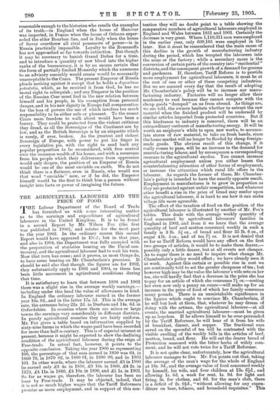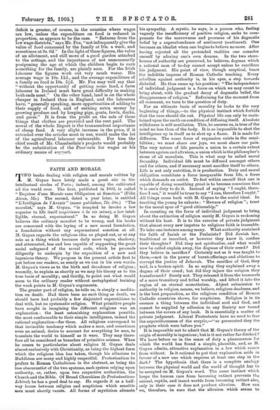It is satisfactory to learn that between 1898 and 1902
there was a slight rise in the average weekly earnings,— including under this head the value of allowances in kind. In England the ordinary labourer earned in the former year 16s. 9d., and in the latter 17s. 5d. This is the average rate, the extremes being 22s. 2d. in Durham and 14s. 6d. in Oxfordshire. In counties where there are mines or large towns the earnings vary considerably in different districts. In purely agricultural counties they are fairly uniform. Mr. Fox gives a table based on information supplied by sixty-nine farms in which the wages paid have been recorded for more than half-a-century. This is of especial interest at present, because it might be expected to show the declining condition of the agricultural labourer during the reign of Free-trade. In actual fact, however, it points to the opposite conclusion. Taking the year 1900 as representing 100, the percentage of that sum earned in 1850 was 64, in 1860 76, in 1870 82, in 1880 91, in 1890 90, and in 1903 101. In other words, where the labourer earned £5 in 1900 he earned only £3 4s. in 1850, £3 16s. in 1860, £4 2s. in 1870, £411s. in 1880, £410s. in 1890, and £5 ls. in 1903. So far as wages go, therefore, the labourer has been no loser by Free-trade. It may be objected, indeed, that it is not so much higher wages that the Tariff Reformers promise as more employment, and in support of this con- tention they will no doubt point to a table showing the comparative numbers of agricultural labourers employed in England and Wales between 1851 and 1901. Certainly the decrease is very great. Where 1,110,311 men were employed in the earlier year, only 609,105 were employed in the later. But it must be remembered that the main cause of this decline is the growth of manufacturing industry during the period, which has tempted the labourers into the mine or the factory ; while a secondary cause is the conversion of certain parts of the country into "residential" districts, and the consequent growth of a demand for grooms and gardeners. If, therefore, Tariff Reform is to provide more employment for agricultural labourers, it must be at the cost of one or other of these competing industries. But we are assured every day that the result of adopting Mr. Chamberlain's policy will be to increase our manu- facturing industry. Factories will no longer allow their machinery to rust because they cannot compete with the cheap goods "dumped" on us from abroad. As things are, we are told, the owners hesitate whether to extract the raw material when the finished product will be undersold by similar articles imported from protected countries. But if this hindrance to industry is removed, there will be an extraordinary outburst of manufacturing energy. It will be worth an employer's while to open new works, to accumu- late stores of raw material, to take on fresh hands, since the home market will no longer be flooded by cheap foreign- made goods. The obvious result of this change, if it really comes to pass, will be an increase in the demand for manufacturing labour, and by consequence a corresponding increase in the agricultural exodus. You cannot increase agricultural employment unless you either lessen the counterbalancing attraction of other forms of employment, or increase the attraction which rural life offers to the labourer. As regards the former of these, Mr. Chamber- lain's policy is intended to have the exactly opposite result. Employment in manufactures is to grow in proportion as they are protected against unfair competition, and whatever other benefit a rise in the price of bread may confer upon the agricultural labourer, it is hard to see how it can make village life more agreeable.
The effect of the taxation of food on the position of the agricultural labourer is illustrated by another of Mr. Fox's tables. This deals with the average weekly quantity of food consumed by agricultural labourers' families in England in 1903, and from it we learn that the average quantity of beef and mutton consumed weekly in such a family is 3 lb. 54 oz., of bread and flour 35 lb. 6 oz., of sugar 41b. 5 oz., and of tea 71 oz. It is not denied that so far as Tariff Reform would have any effect on the first two groups of articles, it would be to make them dearer,— possibly only a little dearer, but at all events not cheaper. As to sugar there is no need to inquire what change Mr. Chamberlain's policy would. effect ; we have already seen it at work. Against this certain or possible rise in cost we are continually told to set the greater cheapness of tea ; but however high may be the value the labourer's wife sets on her tea, she will hardly find that a decrease in the price she has to pay for an article of which she consumes 71 oz.—costing her even now only a penny an ounce—will make up for an increase in the price of food of which her family consumes many pounds. There is an unmistakable significance in the figures which ought to convince Mr. Chamberlain, if he will but look at them, that, whatever he may dream of doing with the artisan, the agricultural labourer—at all events, the married agricultural labourer—must be given up as hopeless. If he allows himself to be over-persuaded by the Tariff Reformer, he will hear of it from his wife at breakfast, dinner, and supper. The fractional sum saved on the spoonful of tea will be contrasted with the visible swelling of the weekly bills in the articles of beef, mutton, bread, and flour. He will eat the dearer bread of Protection seasoned with the bitter herbs of wifely com- ment, and he will not vote twice for a Tariff Reformer.
It is not quite clear, unfortunately, how the agricultural labourer manages to live. Mr. Fox points out that, taking the average of the man's wage for the whole of England at 18s. 3d., and the average value of food consumed weekly by himself, his wife, and four children at 13s. 6d., and allowing ls. 6d. a week for rent, ls. 9d. for light and firing, 3s. for clothes, and 6d. for the man's club, there is a deficit of 2s. op., " without allowing for any expen- diture on beer, tobacco, and household requisites." This deficit is greater, of course, in .the counties where wages are low, unless the expenditure on food is reduced in proportion, as appears to be the case. " Returns from the low wage districts," says Mr. Fox, "not infrequently give the value of food consumed by the family at 10s. a week, and sometimes at 9s. 6d." In the light of these figures, the value of an allotment, and still more of a good garden attached to the cottage, and the importance of not unnecessarily postponing the age at which the children begin to earn something for the family, are plainly seen. For the Irish labourer the figures work , out very much worse. His average wage is 10s. lid., and the average expenditure of a family on food is 10s. 50. Mr. Fox may well say that " without the opportunity of getting some land, a farm labourer in Ireland must have great difficulty in making both ends meet." On the other hand, land is on the whole cheaper in Ireland than in England, and the labourers have, " generally speaking, more opportunities of adding to their supply of food, and of earning extra money by growing produce and by keeping pigs, goats, fowls, ducks, and geese." It is from the profit on the sale of these things that clothes are provided and the rent paid. The moral of the whole Report is the transcendent importance of cheap food. A very slight increase in the price, if it extended over the articles most in use, would make the lot of the agricultural labourer unbearable. For him the chief result of Mr. Chamberlain's projects would probably be the substitution of the Poor-rate for wages as his ordinary means of support.







































 Previous page
Previous page